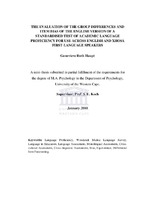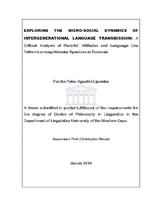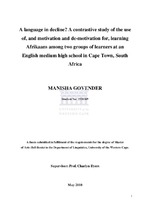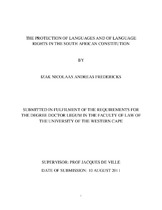The evaluation of the group differences and item bias of the English version of a standardised test of academic language proficiency for use across English and Xhosa first-language speakers
Abstract
South Africa's Language-in-Education Policy is one of additive multilingualism, but in reality this policy is not adhered to, in that most black children are being educated through the medium of English from Grade 4. This type of instruction affects the development of academic language proficiency in their primary language, as these children are not engaging in cognitively demanding tasks in their primary or first language. The Woodcock Muñoz Language Survey (WMLS) is a test to assess academic language proficiency in Additive Bilingual Education, and is extensively used in the United States of America (USA) for this purpose. It is important to note that the proposed study is a sub-study of a larger study, in which the original WMLS (American-English version) was adapted into English and Xhosa, to be used in South Africa to assess additive bilingual programmes. For this sub-study, the researcher was interested in examining the overall equivalence of the adapted English version of the WMLS. Owing to insufficient tests evaluating academic language proficiency in the South African context, the significance, as well as the overall aim, of the study is to ensure that the issues of group difference and item bias have been assessed to ensure that the adapted English version of the WMLS is suitable to be used across English first-language and Xhosa first-language speakers. Because this is a sub-study, the researcher (of the sub-study) has conducted an exploratory quantitative study with the use of Secondary Data. The researcher has used the framework of equivalence as a theoretical framework in order to examine the research question. Given the use of existing data, the procedures of the collection of the data by the researcher of the larger study have been outlined in the Methodology section of the present study. The sample consisted of 198 English and 197 Xhosa first-language speakers.
Collections
Related items
Showing items related by title, author, creator and subject.
-
Exploring the micro-social dynamics of intergenerational language transmission: a critical analysis of parents's attitudes and language use patterns among Ndamba speakers in Tanzania
Lipembe, Pembe Peter Agustini (University of the Western Cape, 2010)The study has several implications; for general theoretical traditions it highlights the point that ambivalent attitudes and incomplete language use are responsible for gradual language decline. Previous studies while ... -
A language in decline ? :a constrastive study of the use of, and motivation and de-motivation for, learning Afrikaans among two groups of learners at an English medium high school in Cape Town, South Africa
Govender, Manisha (University of the Western Cape, 2010)Afrikaans in practice replaced Dutch and became one of South Africa's official languages (along with English) from 1925. It reached the apex of its development and influence during the years of Nationalist party rule and ... -
The protection of languages and of language rights in the South African constitution
Fredericks, Izak Nicolaas Andreas (University of the Western cape, 2011)The 1996 South African Constitution contains a number of provisions that deal specifically with the protection of languages and of rights relating to language. The most important of these is section 6 which recognises 11 ...




